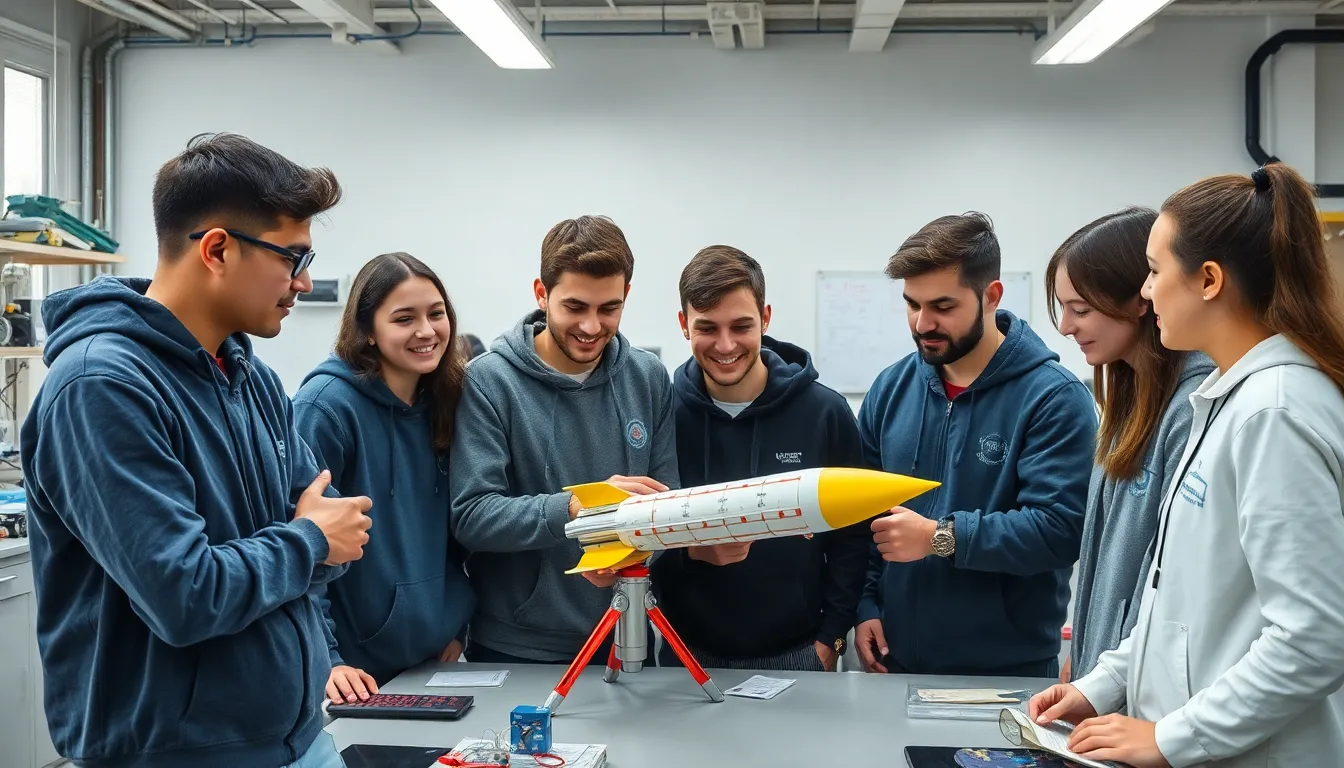In a world where the sky’s not the limit but just the beginning, the Institute of Space Technology stands as a beacon for aspiring astronauts and engineers alike. Imagine a place where dreams of exploring the cosmos come alive, and students learn to turn science fiction into reality. With cutting-edge programs and a curriculum that’s out of this world, it’s no wonder this institute is the launchpad for the next generation of space pioneers.
Table of Contents
ToggleOverview of Institute of Space Technology
The Institute of Space Technology stands out as a leading educational institution for students aiming to excel in aerospace fields. Located in Pakistan, it offers specialized programs in aerospace engineering, space science, and avionics. Students gain access to cutting-edge technology and hands-on experience in laboratories that support advanced research.
Curriculum development at the institute includes collaboration with international space agencies and universities. Through these partnerships, students engage in projects that enhance their understanding of space missions and technologies. Graduates emerge equipped with skills highly sought after in aerospace industries globally.
Research opportunities abound within the institute, fostering innovation in satellite development and space exploration. Facilities such as the spacecraft design labs and rocket propulsion testing centers provide real-world contexts for theoretical knowledge. Faculty members, comprising experienced professionals and scholars, mentor students, ensuring they receive valuable insights into industry standards.
The institute also emphasizes the significance of developing soft skills, such as teamwork and communication. Participation in workshops and competitions cultivates an environment for students to showcase their talents. Additionally, internships with notable aerospace companies enrich the educational experience, bridging the gap between study and practice.
The Institute of Space Technology plays a pivotal role in nurturing the next generation of space scientists and engineers, with its comprehensive programs, research initiatives, and industry connections. The institute not only prepares students for careers but also contributes to advancements in space technology.
Academic Programs Offered

The Institute of Space Technology provides a range of academic programs designed to prepare students for careers in the aerospace sector. Its curriculum suits various interests within the realm of space technology.
Undergraduate Programs
Undergraduate programs focus on foundational knowledge in fields like aerospace engineering and space science. Students pursue Bachelor’s degrees that equip them with critical skills for tackling complex engineering challenges. Specific courses cover topics such as fluid dynamics, orbital mechanics, and satellite systems design. Hands-on projects often emphasize practical applications, fostering an interactive learning experience. Additionally, students benefit from internships that promote industry exposure, enhancing their readiness for future employment.
Graduate Programs
Graduate programs at the institute enable students to specialize in advanced areas of space technology. Master’s degrees in fields such as avionics, satellite engineering, and space systems management offer in-depth study. Students engage with cutting-edge research that contributes to ongoing developments in aerospace. Collaborative projects with international organizations provide invaluable insights into current practices. Faculty mentorship emphasizes innovation, preparing graduates to lead in the aerospace and space exploration industries.
Research and Development Initiatives
The Institute of Space Technology prioritizes research and development to advance space technologies and education. It focuses on critical areas that impact both local and global aerospace sectors.
Key Research Areas
Aerospace engineering stands out as a major focus at the institute. Researchers dedicate efforts to satellite systems, developing technology that enhances communication and surveillance capabilities. Space science research investigates the cosmos, exploring advancements in planetary studies and astrobiology. Another area of interest includes rocket propulsion, where innovations aim for greater efficiency in launch technologies. Faculty and students collaborate on real-world challenges, making significant contributions to the field of space exploration.
Collaborations and Partnerships
The institute engages in extensive collaborations with international space agencies. Partnerships with NASA and ESA enhance access to cutting-edge research initiatives. Students participate in joint projects, gaining exposure to global standards and practices. Local universities also contribute, fostering a shared environment of innovation. Such collaborations create opportunities for internships and knowledge exchange, ultimately benefiting students and enhancing the institute’s research capabilities.
Facilities and Infrastructure
The Institute of Space Technology features a range of advanced facilities that support its educational and research objectives. Spacecraft design labs allow students to simulate real-world scenarios while developing innovative technology. Rocket propulsion testing centers provide essential hands-on experience, aiding in the understanding of how propulsion systems operate.
Research laboratories play a critical role in the institute’s commitment to advancing space technology. These labs enable faculty and students to collaborate on satellite development and experimentation, fostering an environment of innovation. Access to state-of-the-art equipment enhances students’ practical experiences, ensuring alignment with industry standards.
Additionally, the institute maintains a modern library equipped with resources on space science and engineering. Scholars can pursue in-depth studies while utilizing extensive databases and research materials. This resource availability supports academic excellence and encourages students to undertake ambitious projects.
Collaboration spaces facilitate teamwork among students on various projects. Such environments encourage creativity and idea-sharing, which are crucial for successful outcomes in aerospace challenges. Workshops also integrate soft skills training, allowing students to develop effective communication and collaboration capabilities.
Furthermore, the Institute of Space Technology actively partners with prominent aerospace organizations. Students benefit from internships that offer real-world insights and professional development opportunities. Engaging with external industry leaders cultivates essential connections for future employment prospects in international aerospace sectors.
Overall, the combination of cutting-edge facilities and strategic partnerships highlights the institute’s commitment to providing a robust framework for both education and research in space technology.
Student Life and Community Engagement
Student life at the Institute of Space Technology focuses on fostering a dynamic and engaging atmosphere. Students participate in various extracurricular activities that promote teamwork and leadership skills. Active clubs and societies cater to diverse interests, including robotics, space science, and environmental advocacy.
Community engagement holds significant importance within the institute. Students routinely participate in outreach programs aimed at educating local schools about space and technology, inspiring the next generation of scientists and engineers. This collaborative approach not only enhances university-community relations but also strengthens students’ communication skills.
Mentorship programs connect students with faculty and industry professionals. Experienced mentors provide guidance on academic challenges and career paths, enhancing students’ learning experiences. Networking events and seminars with guest speakers from the aerospace sector offer additional insights into potential career opportunities.
Volunteer initiatives allow students to contribute to community projects, from environmental clean-ups to educational workshops. Such involvement cultivates a sense of responsibility and belonging among students. Additionally, these experiences reinforce the institute’s commitment to developing socially conscious graduates.
Recreational facilities promote well-being and foster camaraderie among students. Sports teams compete at intercollegiate levels, emphasizing teamwork and discipline. Social events, such as cultural festivals, further engage the student body, building a vibrant campus culture.
Regular feedback from students shapes the institute’s community activities and engagement strategies. Responsive administration values student input, ensuring that initiatives remain relevant and beneficial. Through this commitment to student life and community engagement, the Institute of Space Technology solidifies its role as a nurturing environment for future leaders in aerospace.
The Institute of Space Technology stands out as a beacon for those passionate about aerospace and space exploration. Its innovative programs and state-of-the-art facilities prepare students to tackle the challenges of the aerospace industry. With a strong emphasis on research and collaboration with global agencies, students gain invaluable experience that enhances their career prospects.
The vibrant community and extracurricular opportunities foster personal growth and teamwork skills, ensuring graduates are well-rounded professionals. As it continues to shape the future of space science and technology, the institute remains committed to nurturing the next generation of pioneers ready to explore the final frontier.





